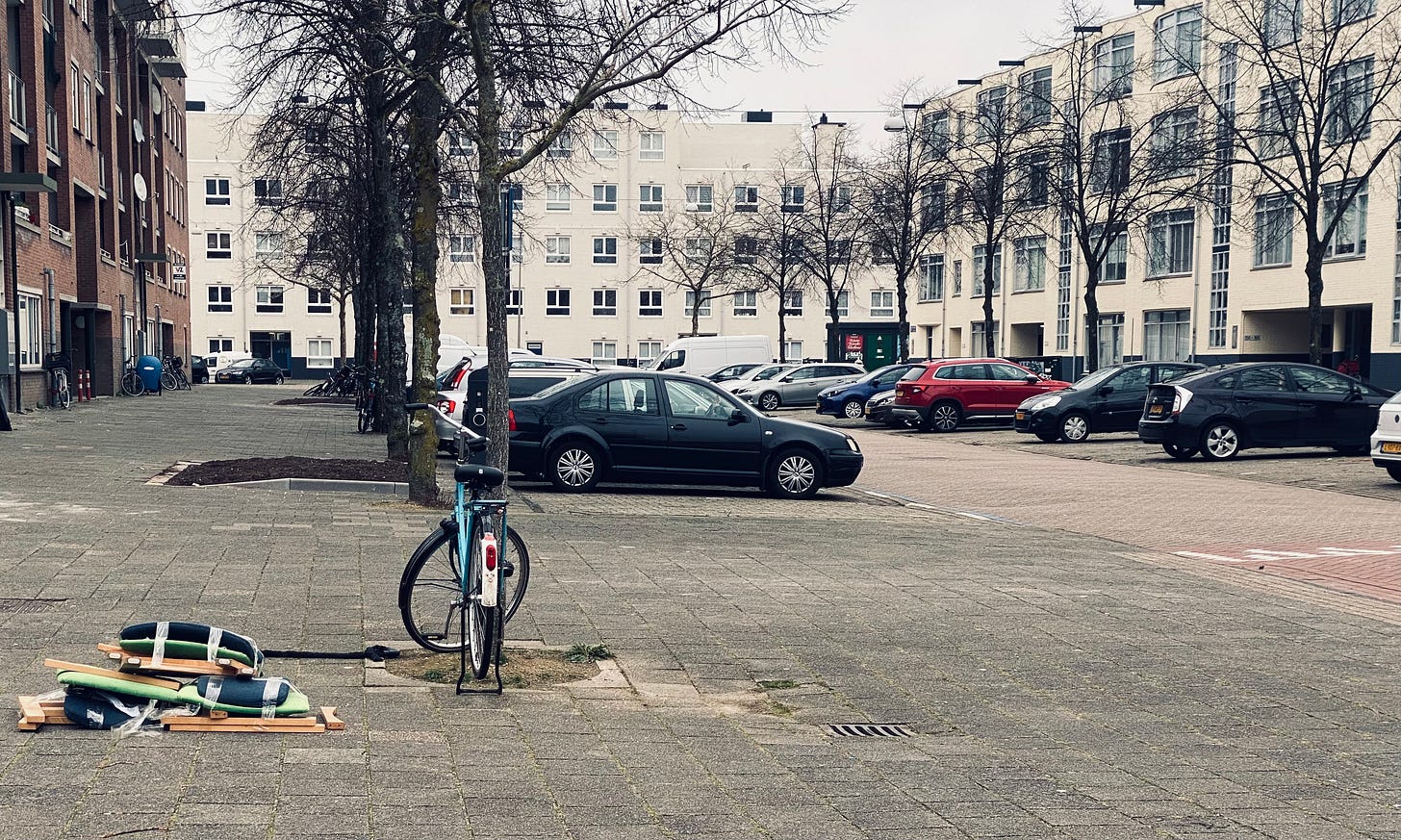Shifting to new metrics for platform engineering
“On the Internet, the truth is paywalled and the bullshit is free.” Also, a new Garbage Chairs of Amsterdam.
Suggested theme song for this episode:
Changing Infrastructure People’s Metrics
I’ve been working on a new-ish presentation for Thursday. I went back and reviewed my colleague, Darran Rice’s comments in a recent talk on transitioning “traditional” infrastructure and ops people to a (as we’d say now) platform engineering approach. He worked at UBS until coming to work at VMware, so his advice is based on REAL WORLD EXPERIENCE, as they say. He’s got this great slide:
I’d forgotten that he wrote up advice on shifting the metrics (KPIs, or whatever) you use to match your new, platform-y goals. It’s good!
For example:
What do you want to achieve?
“I want to use the cloud to increase the lead time and frequency with which I can deploy my applications.”
Consider a KPI that measures lead time from code check-in to release to Production, as well as potentially another KPI that measures the number of releases over a period of time. This will ensure the project addresses issues such as app modernization and your Software Development Lifecycle process, not just deploying applications into a cloud.
“I want my developers to spend less time on getting infrastructure stood up and more time on coding.”
Consider a KPI that measures the decrease in lead time to spin up infrastructure, compared to on premises. If you already track how developers spend their time, you could consider a KPI that measures an increase in the number of hours spent coding.
“I want to move my applications to the cloud so I can exit a colocation, as the costs are far too high.”
Consider a KPI that measures decommissioning of applications and infrastructure in that colocation. Moving 100 applications to the cloud and leaving one behind doesn’t achieve your goal if you need to maintain that colocation just for one app. Equally you could consider a KPI that tracks the cost.
“I want to reduce my risk exposure.”
Consider a KPI that tracks how many vulnerabilities are addressed across the application estate and how quickly. Focus on the most important applications such as those that are internet-facing or deemed most business-critical.
I’m going to have to spend some more time process this content. There’s a related talk from a co-worker that I haven’t fully churned through my brain-grinder yet.
Wastebook
You hear about these 20th century writers, not all of them, but many of them, who would wake up early in the morning and write. Many of them, when you learn about their lives, were clearly hungover. And then you do the math, so to speak, centuries back, and you realize they were all hungover. Or worse.
précis - [From our pal ChatGPT-4:] The word “précis” (pronounced “pray-see”) is derived from the French term “précis,” which means “precise” or “exact.” In English, a précis is a summary or abstract of a text or speech, presenting the main points or ideas in a condensed and clear manner. It is meant to provide a concise, accurate, and coherent representation of the original work while maintaining its overall meaning and tone. Writing a précis is a useful skill for summarizing and condensing information, especially for academic or professional purposes.
“re-introspect” Here.
I’ve been trying to learn how to ask Tyler Cowen questions. Well, first just catalog the general algorithm, structure, model for them - in addition to common questions. There’s obviously a lot of planning ahead and, mostly, research/reading that goes into the questions. However, I’ve listened to him for many years and he has, I don’t know, 20 or 30 questions he frequently uses. Using the ChatGPT/Bing thing to figure those out will be an interesting use case. Also, I should just start writing them down. Here’s one: “What is it your understand of this topic now [after all this time, exposures to things, study, etc.] that you didn't before you got smart on it?” He asks this, in various forms, a lot. I don’t want to know (only) the exact questions, but more the premise behind those questions: how would generate them. A related model for a question he asks is: “what is it that you understand about this topic that the average person who’s intelligent, but not an expert on this topic, does not understand?” He’ll ask people about regional food they either grew up with or have some expertise-by-exposure on. I think he will also ask for micro-comparisons a lot. I was listening in the archives and in this one with Ben Sasse, he asks Sasse to say why Kansas and Nebraska are different and why. The answer isn’t really interesting (Sasse takes some time to warm up and is good at deflecting with a smile and laugh), but I think it works with author guests.
“On the Internet, the truth is paywalled and the bullshit is free.” Tim Bray.
“We’re all just piecing together our own narratives, because there is no mass narrative.” Notes on a Weird Week.
“Just try to make it sound like you wrote it that way on purpose.” - I know I have given this to you many times, but it is the most concise, most perfect guidance for life. (You’re welcome.)
Don’t fart before you sit down because then you’re sitting in your own fart.

Relative to your interests
Good overview of the VMware Tanzu method for modernizing applications, Swift - from regular apps to mainframe apps.
The LLM Problem - Tim Bray on the AI stuff.
Warp: The terminal for the 21st century - A command line terminal that has pretty colors, AI stuff built in, and other niceties. You have to create an account to use it, so I’m sure there’s lots of old school command line people who’ll just $NOPE_OUT
GPT-4 in 10 Keys - by Alberto Romero - A bit more in-depth of an overview of what’s in there. ChatGPT doesn’t get access to most of the new features? What matters most to me is feeding it my own information. If it could get to accepting about an hour of transcribed talking (a conference presentation), that’d be really valuable.
SVB, a week later - “SVB’s failure also exposed Silicon Valley to the harsh reality: the larger world hates the tech industry and what it has come to represent. The outsized nature of the success, matched by the outsized bravado and machismo of its fake prophets, has eroded all goodwill for one of the most critical sectors of the US economy.”
Competition - This kind of an interesting concept. If you’ve found something that works for you, don’t worry about competing products, other choices, FOMO. Depending on what it is, you probably want to re-asses every year, or some long period. // “And so we’d get a lot of questions about Mapbox versus OpenStreetMap, whether we were competing with them, replacing them, and why use one when the other is free. There are answers to those questions, but does it matter? The reality is that most people don’t have the time or need to understand the differences between different companies and products. If the first thing they try works, then great - even if it isn’t the perfect, most efficient way to do it. This is, after all, what advertising is: a way of telling people that some product is the thing that they need.”
Logoff
We all think about focusing more, “doing less” to do higher quality work, and all that. Do we actually get there? How is it even possible? When it comes to trying to do less to focus, what I usually lack are inputs from “above” about priorities: how do I determine what to cut and what to focus on? When that kind of direction is lacking, I use two methods: deadline and my own excitement.
Deadlines and ad hoc projects (“can you give a presentation next week to some Luxembourg banks?”) are unavoidable; they’re part of being modern knowledge worker, especially one that works with the public. Those are actually easy to manage and deal with. What’s difficult is figuring out goes in that important but not urgent box.
One of those things is coming up with two new talks. I don’t really even know what’d be good and helpful to talk about. Got any ideas?



